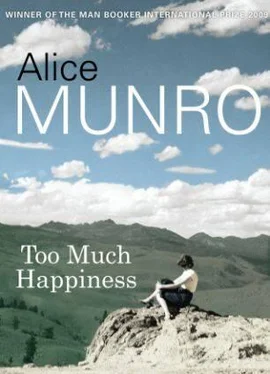Then the dim lamps of a village, and some passengers are getting up, methodically bundling themselves and collecting their bags and packages and clambering down from the train, disappearing. The journey resumes, but in a short time everybody is ordered off again. Not because of snowdrifts this time. They are herded onto a boat, another small ferry, which takes them out onto black water. Sophia’s throat is so sore now that she is sure she could not speak if she had to.
She has no idea how long this crossing is. When they dock everybody has to enter a three-sided shed, where there is little shelter and no benches. A train arrives after a wait she cannot measure. And when this train comes, what gratitude Sophia feels, though it is no warmer and has the same wooden benches as the first train. One’s appreciation of meager comforts, it seems, depends on what misery one has gone through before getting them. And is not that, she wants to say to somebody, a dreary homily?
In a while they stop in a larger town where there is a station buffet. She is too tired to get off and make her way to it as some passengers do, coming back with steaming cups of coffee. The woman who ate the cabbage is, however, carrying two cups, and it turns out that one is for Sophia. Sophia smiles and does her best to express gratitude. The woman nods as if this fuss is unnecessary, even unseemly. But she keeps standing there till Sophia takes out the Danish coins she received from the ticket agent. Now the woman, grunting, picks out two of them with her damp mittened fingers. The cost of the coffee, very likely. For the thought, and for carrying it, no charge. This is the way of things. Without a word the woman then returns to her seat.
Some new passengers have got on. A woman with a child about four years old, one side of its face bandaged and one arm in a sling. An accident, a visit to a country hospital. A hole in the bandage shows a sad dark eye. The child puts its good cheek down in its mother’s lap and she spreads part of her shawl over its body. She does this in a way that is not particularly tender or concerned, but somewhat automatic. Something bad has happened, more care has been added on to her, that is all. And the children waiting at home, and perhaps one in her belly.
How terrible it is, Sophia thinks. How terrible is the lot of women. And what might this woman say if Sophia told her about the new struggles, women’s battle for votes and places at the universities? She might say, But that is not as God wills. And if Sophia urged her to get rid of this God and sharpen her mind, would she not look at her-Sophia-with a certain stubborn pity, and exhaustion, and say, How then, without God, are we to get through this life?
They cross the black water again, this time on a long bridge, and stop in another village where the woman and child get off. Sophia has lost interest, does not look to see if there is somebody waiting for them, she is trying to see the clock outside the station, lit up by the train. She expects the time to be near midnight, but it is just past ten o’clock.
She is thinking of Maksim. Would Maksim ever in his life board such a train as this? She imagines her head lying comfortably on his broad shoulder-though the truth is he would not care for that, in public. His coat of rich expensive cloth, its smell of money and comfort. Good things he believes he has a right to expect and a duty to maintain, even though he is a Liberal unwelcome in his own country. That marvellous assurance he has, that her father had, you can feel it when you are a little girl snuggled up in their arms and you want it all your life. More delightful of course if they love you, but comforting even if it is only a kind of ancient noble pact that they have made, a bond that has been signed, necessarily even if not enthusiastically, for your protection.
They would be displeased to have anybody call them docile, yet in a way they are. They submit themselves to manly behavior. They submit themselves to manly behavior with all its risks and cruelties, its complicated burdens and deliberate frauds. Its rules, which in some cases you benefited from, as a woman, and then some that you didn’t.
Now she had an image of him-Maksim, not sheltering her at all but striding through the station in Paris as befitted a man who had a private life.
His commanding headgear, his courtly assurance.
That had not happened. It was not Maksim. Assuredly it was not.
Vladimir had not been a coward-look how he had rescued Jaclard-but he did not have the manly certainties. That was why he could grant her some equality those others couldn’t and why he could never grant her that enveloping warmth and safety. Then near the end when he came under the Ragozin influence and changed his tune-desperate as he was and thinking that he might save himself by aping others-he turned to treating her in an unconvincing, even ridiculous, lordly style. He had given her then an excuse for despising him, but maybe she had despised him all along. Whether he worshipped or insulted her it was impossible for her to love him.
As Aniuta loved Jaclard. Jaclard was selfish and cruel and unfaithful and even while she hated him she was in love with him.
What ugly and irksome thoughts could surface, if you didn’t keep a lid on them.
When she closed her eyes she thought she saw him-Vladimir-sitting on the bench across from her, but it is not Vladimir, it is the doctor from Bornholm, it is only her memory of the doctor from Bornholm, insistent and alarmed, pushing himself in that queer humble way into her life.
There came a time-surely it was near midnight-when they had to leave this train for good. They had reached the border of Denmark. Helsingor. The land border, at least-she supposed the true border was somewhere out in the Kattegat.
And there was the last ferry, waiting for them, looking large and pleasant, with its many bright lights. And here came a porter to carry her bags on board, and thank her for her Danish coins and hasten away. Then she showed her ticket to the officer on board and he spoke to her in Swedish. He assured her that they would make connections on the other side with the train for Stockholm. She would not have to spend the rest of the night in a waiting room.
“I feel as if I have come back to civilization,” she said to him. He looked at her with slight misgiving. Her voice was a croak, though the coffee had helped her throat. It is just because he is a Swede, she thought. It is not necessary to smile or pass remarks among the Swedes. Civility can be maintained without that.
The crossing was a little rough, but she was not seasick. She remembered the tablet but she did not need it. And the boat must have been heated, because some people had taken off the upper layer of their winter clothing. But she still shivered. Perhaps it was necessary to shiver, she had collected so much cold in her body in her journey through Denmark. It had been stored inside her, the cold, and now she could shiver it out.
The train for Stockholm was waiting, as promised, in the busy port of Helsingborg, so much livelier and larger than its similarly named cousin across the water. The Swedes might not smile at you, but the information they gave out would be correct. A porter reached for her bags and held them while she searched in her purse for some coins. She took a generous number out and put them in his hand, thinking they were Danish; she would not need them anymore.
They were Danish. He gave them back to her, saying in Swedish, “These will not do.”
“They are all I have,” she cried, realizing two things. Her throat felt better and indeed she had no Swedish money.
He put down her bags and walked away.
French money, German money, Danish money. She had forgotten Swedish.
The train was getting up steam, the passengers boarding, while she still stood there in her quandary. She could not carry her bags. But if she could not, they would be left behind.
Читать дальше












